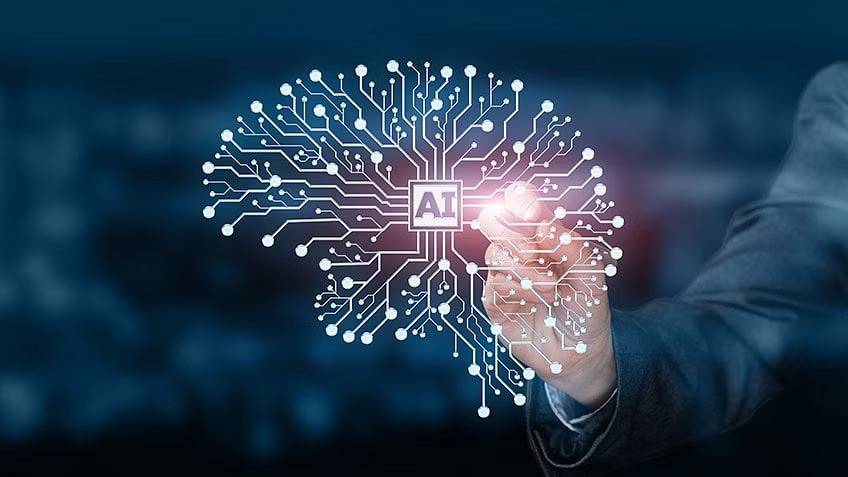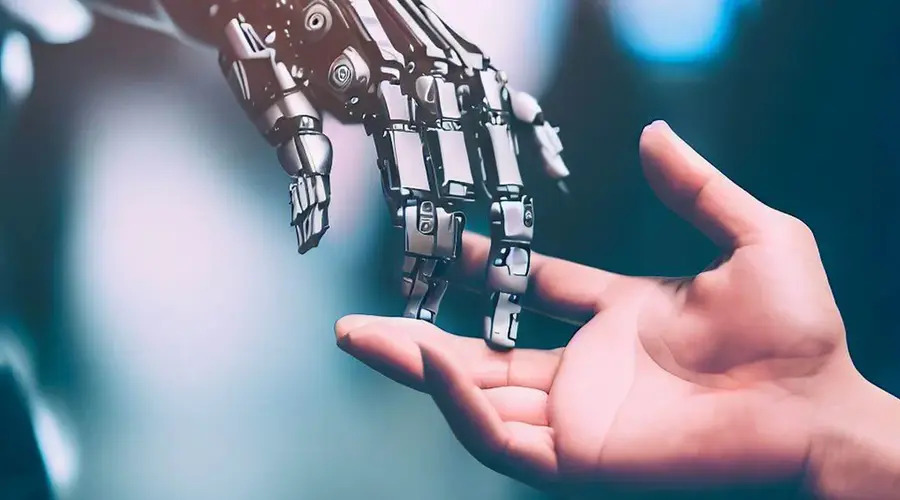A Technological Revolution:
artificial Intelligence (AI) is a technical marvel that is altering industries and expanding the possibilities of what robots can accomplish. In this blog, we will explore the revolutionary influence of AI, ethical issues, and the tremendous possibility that lies ahead as we negotiate the frontiers of artificial intelligence.
artificial intelligence & technologies:
The confluence of complex algorithms, large data, and computer power is represented by artificial intelligence. AI technologies, ranging from machine learning to natural language processing, mimic human intelligence, allowing robots to learn, reason. The emergence of AI has transformed a wide range of industries, from healthcare and banking to manufacturing and entertainment.
Transformative Applications:
AI applications are numerous and ever-expanding. Virtual assistants, such as Siri and Alexa, have become commonplace in our daily lives, demonstrating natural language processing skills. AI supports with diagnostics and medication development in healthcare, while autonomous cars promise to alter the way we travel in transportation. AI’s adaptability demonstrates its potential to improve efficiency and problem-solving across a wide range of fields.
Considerations for Ethical Behavior:
As AI progresses, ethical concerns become more important. Bias in algorithms, privacy problems, and the possible influence on employment all need careful consideration. To guarantee that AI serves mankind without unwittingly inflicting harm or increasing current societal imbalances, it is critical to strike a balance between technical innovation and ethical responsibility.
The Meeting of Art and Technology:
AI’s influence extends into the realm of creativity, challenging traditional notions of human-generated art. AI algorithms can compose music, generate visual art, and even write poetry. This intersection of art and technology raises intriguing questions about the nature of creativity and the collaborative potential between humans and machines in the creative process.
In the rapidly advancing landscape of technology, artificial intelligence (AI) has emerged as a transformative force, reshaping the way we live, work, and interact with the world. This article delves into the intricacies of artificial intelligence, exploring its evolution, applications across various industries, ethical considerations, and the profound impact it continues to have on our society.
The Genesis of Artificial Intelligence:
The concept of artificial intelligence dates back to ancient times, but the term gained prominence in the mid-20th century. Pioneering figures such as Alan Turing and John McCarthy laid the groundwork for AI, envisioning machines that could mimic human intelligence. The field has since witnessed exponential growth, with advancements in computing power, algorithms, and data availability propelling AI to the forefront of technological innovation.
Types of Artificial Intelligence:
AI is categorized into two main types: Narrow or Weak AI and General or Strong AI.
Narrow AI: This form of AI is designed to perform specific tasks or solve particular problems. Examples include virtual assistants, image recognition systems, and language translation tools.
General AI: General AI, often portrayed in science fiction, refers to machines with human-like intelligence capable of understanding, learning, and performing any intellectual task. Achieving true General AI remains a complex and ongoing challenge in the field.
Applications Across Industries:
Healthcare: AI is revolutionizing healthcare with applications ranging from diagnostic tools and personalized treatment plans to predictive analytics for disease prevention. Machine learning algorithms can analyze vast datasets to identify patterns and make more accurate predictions, ultimately improving patient outcomes.
Finance: In the financial sector, AI is utilized for fraud detection, algorithmic trading, risk assessment, and customer service. Predictive analytics powered by AI enables more informed investment decisions and enhances overall financial management.
Education: AI is transforming education through personalized learning platforms, adaptive tutoring systems, and intelligent content creation. These technologies cater to individual learning styles, providing students with tailored educational experiences.
Manufacturing: AI-driven robotics and automation have streamlined manufacturing processes, enhancing efficiency and precision. Predictive maintenance powered by AI algorithms minimizes downtime by anticipating equipment failures before they occur.
Transportation: The transportation industry benefits from AI through autonomous vehicles, route optimization, and traffic management systems. AI algorithms enhance safety, reduce congestion, and contribute to the development of smart transportation ecosystems.
Customer Service & artificial intelligence: Virtual assistants and chatbots powered by AI enhance customer service by providing instant responses, resolving queries, and personalizing user experiences. These technologies improve efficiency and contribute to enhanced customer satisfaction.
Machine Learning: The Driving Force of AI:
At the core of many AI applications lies machine learning, a subset of AI that focuses on developing algorithms that enable systems to learn and improve from experience. Machine learning is categorized into three main types:
Supervised Learning: The algorithm is trained on labeled datasets, making predictions or decisions based on input data.
Unsupervised Learning: The algorithm works with unlabeled data to identify patterns and relationships without predefined outputs.
Reinforcement Learning: The algorithm learns through trial and error, receiving feedback based on its actions to optimize decision-making.
Machine learning algorithms play a pivotal role in image and speech recognition, natural language processing, recommendation systems, and a myriad of other applications.
Ethical Considerations in AI:
As AI becomes more ingrained in our daily lives, ethical considerations are paramount. Key concerns include:
Bias and Fairness: AI systems can inadvertently perpetuate biases present in training data, leading to unfair or discriminatory outcomes. Ensuring fairness and addressing bias is crucial for ethical AI deployment.
Transparency: The opacity of some AI algorithms raises questions about accountability and transparency. Efforts to make AI systems more explainable and understandable are essential for building trust.
Privacy: The collection and analysis of vast amounts of personal data by AI systems raise concerns about privacy. Establishing robust data protection measures is crucial to safeguarding individuals’ privacy rights.
Job Displacement: The automation of certain tasks by AI may lead to job displacement. Addressing the social and economic impacts of AI on employment requires proactive measures, including reskilling and upskilling initiatives.
Autonomy and Accountability: As AI systems gain autonomy, defining responsibility and accountability in the event of errors or unintended consequences becomes a complex ethical challenge.
The Future of AI: Challenges and Opportunities:
Explainability: Advancements in creating more interpretable AI models will be critical for widespread adoption. Understanding how AI systems make decisions is vital for building trust among users.
Robustness: Ensuring the robustness of AI systems to handle diverse and unexpected scenarios is an ongoing challenge. Resilient AI algorithms are essential for real-world applications.
Collaboration: Encouraging interdisciplinary collaboration between technologists, ethicists, policymakers, and other stakeholders is vital for addressing complex challenges and fostering responsible AI development.
Regulation and Governance: Establishing clear regulatory frameworks and ethical guidelines for AI development and deployment is crucial for creating a responsible and accountable AI landscape.
Global Collaboration: International collaboration is essential for setting common standards, sharing best practices, and addressing ethical concerns on a global scale.
AI in Popular Culture: Dispelling Myths and Realities:
Popular culture often portrays AI in various forms, from benevolent companions to dystopian overlords. Distinguishing between fictional portrayals and the current state of AI is crucial for understanding the technology’s potential and limitations.
Fiction vs. Reality: While AI in popular culture often depicts autonomous, self-aware entities, real-world AI is more focused on specialized tasks and lacks the generalized intelligence seen in movies and literature.
AI Augmentation: AI is more likely to augment human capabilities than replace them entirely. Human-AI collaboration can lead to synergies that enhance creativity, problem-solving, and efficiency.
Responsible Development: The responsible development and deployment of AI technologies are essential for ensuring that they align with societal values and contribute positively to human well-being.
AI and Human-AI Collaboration:
The synergy between humans and AI holds tremendous potential for addressing complex challenges. Human-AI collaboration involves leveraging AI’s capabilities to enhance human decision-making, creativity, and problem-solving.
Enhanced Decision-Making: AI algorithms can process vast amounts of data to provide insights that inform and enhance human decision-making across various domains.
Creativity and Innovation: AI tools can assist in creative processes, generating ideas, designs, and solutions that humans may not have considered independently.
Efficiency and Productivity: Automation through AI contributes to increased efficiency and productivity, allowing humans to focus on tasks that require emotional intelligence, critical thinking, and complex problem-solving.
AI in Research and Scientific Discovery:
AI has become a powerful tool in scientific research, accelerating discoveries and advancing various fields.
Drug Discovery: AI is used in pharmaceutical research to identify potential drug candidates, predict drug interactions, and optimize drug development processes.
Climate Modeling: AI assists in climate modeling, enabling scientists to analyze vast datasets and make more accurate predictions about climate patterns and environmental changes.
Genomic Research: AI is applied in genomics to analyze genetic data, identify patterns, and gain insights into the genetic basis of diseases.
Materials Science: AI accelerates materials discovery by predicting the properties of new materials, leading to advancements in manufacturing and technology.
Navigating the AI Frontier:
Artificial intelligence stands at the forefront of technological innovation, reshaping industries, influencing societal dynamics, and unlocking new frontiers in research and discovery. As AI continues to evolve, ethical considerations, responsible development, and global collaboration are imperative to ensure its positive impact on humanity. Embracing the potential of AI while addressing challenges will guide us toward a future where artificial intelligence becomes a catalyst for positive transformation, augmenting human capabilities and contributing to a more advanced and interconnected world.








